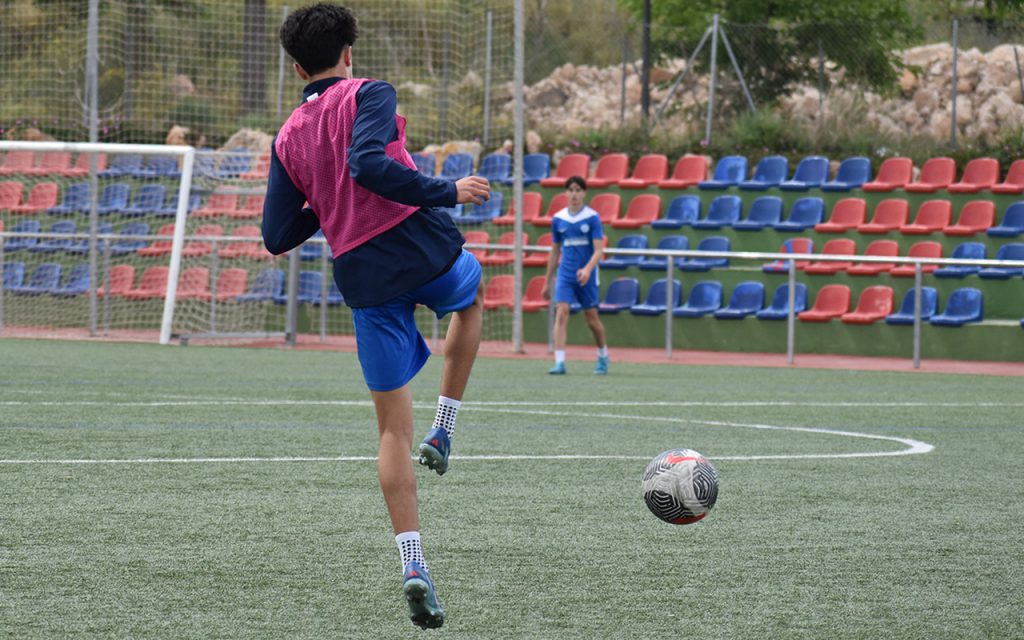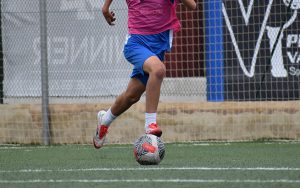Being able to mentally prepare for your first professional trial is just as important—if not more important—than your physical readiness. You might have the fitness, the touch, the vision. But if your head’s not in the right place when the pressure kicks in, all of that can go out the window.
At the professional level, scouts and coaches are not just watching your performance—they’re observing your body language, emotional control, and how you respond to adversity. That’s why serious players train their minds alongside their feet. And for those preparing through structured soccer schools that prioritize mental resilience alongside elite training, this becomes second nature.
Let’s break down exactly how to build a rock-solid mindset for your first pro trial—so when the moment comes, you’re not just ready… you’re locked in.
Table of Contents
- Why Mental Preparation Is Non-Negotiable
- Common Mental Roadblocks Before a Trial
- 1. Control What You Can Control 🎯
- 2. Visualize the Trial Before It Happens 🧠
- 3. Set Performance Goals, Not Outcome Goals 🎯
- 4. Develop a Pre-Trial Routine 🔁
- 5. Stay Present During the Trial 🧘♂️
- 6. Respond to Mistakes Like a Pro 💡
- 7. Embrace the Nerves 😮💨
- 8. Trust Your Preparation 📆
- What Coaches Look For Beyond Skill
- Mental Strength Is a Skill You Can Train
Why Mental Preparation Is Non-Negotiable
Your first professional trial is a high-stakes environment:
- You’re playing with and against unfamiliar players
- Every touch feels like it’s being judged
- You get limited chances to prove yourself
In short? There’s no time to “ease into it.” That’s why players who can manage their nerves, stay focused, and make clear decisions under pressure often stand out—sometimes more than the technically superior ones.
Common Mental Roadblocks Before a Trial
If you’ve got a trial coming up, these thoughts might sound familiar:
😰 “What if I mess up in front of everyone?”
😩 “I need to be perfect to make the cut.”
😐 “Everyone else looks more confident than me.”
These are all normal. But the goal isn’t to eliminate nerves. It’s to learn how to respond to them like a pro.
1. Control What You Can Control 🎯
You can’t control who else shows up. You can’t control the coach’s preference. You can control:
- Your preparation
- Your recovery
- Your mindset
- Your work rate
- Your attitude
Make peace with what’s out of your hands, and double down on what’s in it.
2. Visualize the Trial Before It Happens 🧠
Elite athletes use visualization to “rehearse” pressure situations before they even occur.
Try this in the days leading up to the trial:
- Find a quiet space
- Close your eyes and imagine the trial setting
- Visualize yourself receiving the ball, communicating, making smart decisions
- Imagine both success and small setbacks—and see yourself bouncing back calmly
Visualization helps reduce anxiety because the brain begins to treat the scenario as something familiar.
3. Set Performance Goals, Not Outcome Goals 🎯
Instead of thinking:
❌ “I have to make the team”
Try:
✅ “I’m going to communicate clearly, defend with energy, and make good decisions under pressure.”
You can’t control the final decision. But you can control how you show up.
4. Develop a Pre-Trial Routine 🔁
Nerves love chaos. Create structure instead.
The morning of your trial, follow a clear routine:
- Wake up with plenty of time
- Eat a light, balanced breakfast
- Do a short mobility routine to loosen up
- Review your key focuses or a few calming affirmations
Example affirmations:
💬 “I belong here.”
💬 “One play at a time.”
💬 “I’ve trained for this moment.”
Stick to a routine that calms your nerves and gets you in the zone.
5. Stay Present During the Trial 🧘♂️
The biggest mental trap? Overthinking.
You might catch yourself thinking:
- “That pass was terrible.”
- “I haven’t done anything noticeable yet.”
- “They’re probably not impressed.”
Refocus with this habit:
🧠 Check in every few minutes with a deep breath and a single thought:
“What’s happening right now, and how can I help?”
Staying present reduces panic and improves decision-making.
6. Respond to Mistakes Like a Pro 💡
You will make a mistake. Everyone will. What matters is how you respond.
✅ Don’t:
- Drop your shoulders
- Stop running
- Argue or blame others
✅ Do:
- React immediately with positive body language
- Recover fast and show effort
- Stay vocal and involved
Coaches often look for resilience more than perfection.
7. Embrace the Nerves 😮💨
Nervous energy is your body’s way of getting ready. It means the moment matters. Instead of fighting it, welcome it.
Here’s a trick: Reframe nerves as readiness.
Tell yourself: “This is my body preparing to compete, and that’s a good thing.”
Use controlled breathing before the match or during downtime:
Inhale for 4 seconds → Hold for 4 → Exhale for 4 → Hold for 4 (repeat 3–5 times)
8. Trust Your Preparation 📆
By the time the trial comes, your job is no longer to get better—it’s to trust what you’ve built.
Remind yourself:
- You’ve trained for this
- You’ve played in pressure games before
- You’re here for a reason
Let go of the pressure to prove something, and just focus on doing your job well.
What Coaches Look For Beyond Skill
During a trial, coaches aren’t just checking your footwork. They’re watching for:
👀 Your attitude when you’re not on the ball
🎙️ Your communication with teammates
📍 Your understanding of positioning
🧠 Your ability to stay engaged after setbacks
That’s why a strong mindset is one of the best ways to stand out—even if you’re not the flashiest player on the pitch.
Mental Strength Is a Skill You Can Train
Learning how to mentally prepare for your first professional trial isn’t about being fearless—it’s about learning to feel fear and perform anyway.
You don’t need to be perfect. You need to be present. You need to compete. And you need to show that you’re not just a player—they’re looking at a future professional.
So breathe. Focus. Trust yourself. And go play your game.
And if you want to step into an environment that prepares you for these moments with the same intensity and professionalism as the game itself, training within an profesional soccer academy that builds tactical, technical and mental strength could be the move that sets you apart.
Let the nerves come. Then let your game do the talking. ⚽🧠🔥




